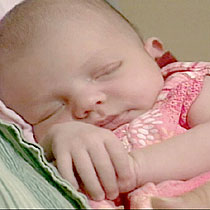2007年VOA标准英语-Signs Of Weaker Hearing Found In SIDS Babies
时间:2019-01-30 作者:英语课 分类:2007年VOA标准英语(八月)
Washington
02 August 2007
Doctors estimate that one out of every 1,000 babies around the world die of a condition called Sudden Infant Death Syndrome 1 [also known as 'crib death' or 'cot death']. It is a parent's worst nightmare: the baby goes to sleep and never wakes up. While there is no known cause, some doctors have found a common symptom among a group of babies who died of SIDS. VOA's Melinda Smith has details.

Sleeping baby
A sleeping baby is a peaceful sight for many parents. But when Marchand Lewis tried to wake her baby daughter Suzanna, she knew instantly something was terribly wrong. "She was lifeless and heavy and limp. So I absolutely knew."
This photograph of Suzanna was taken the day before she died. Her mother had done what doctors always advise - put the baby to bed on her back and take the blanket out of the crib.
There are a number of theories about what causes sudden infant death, which usually occurs in the first six months of life. Doctors say most of the babies are found sleeping on their stomach or side. One study in 2006 found abnormalities in the brain that influenced breathing, temperature and ability to wake up.
Researchers recently looked at medical records of 31 babies in the U.S. state of Rhode Island who had died of SIDS. Matching them against data of other similarly healthy babies, they discovered that the crib [cot] death infants all had consistently lower hearing in their right ear.
Dr. Daniel Rubens of Children's Hospital in Seattle, Washington is one of the study's authors. "I had a hunch 2. And then you look in the inner ear and you know, yes, look! There's something here."
All of the babies in the study had had a simple, inexpensive hearing test routinely done on newborns. It measures the signal to noise ratio of the inner ear with three frequencies. The affected 3 babies scored four points lower on the test.
Researchers believe the inner ear has microscopic 4 hairs that send messages to the brain. The doctors also theorize that the hair cells tell the brain how much carbon dioxide is in the blood. If the cells are damaged, breathing could be interrupted.
The study may eventually lead to further research about the functions of a baby's inner ear. In the meantime, Dr. Gerald Laughlin of New York's Weill Cornell Medical College is more cautious."...it's way too early for parents to be focusing on these subtle differences. There have been lots of suggested markers for SIDS that have not panned out when subjected to closer studies at a later date."
But while it is too late for Suzanna Lewis and other crib death babies, the doctors who conducted the study say this discovery will lead to a 'new line of inquiry 5 into SIDS research.'
- The Institute says that an unidentified virus is to blame for the syndrome. 该研究所表示,引起这种综合症的是一种尚未确认的病毒。
- Results indicated that 11 fetuses had Down syndrome. 结果表明有11个胎儿患有唐氏综合征。
- I have a hunch that he didn't really want to go.我有这么一种感觉,他并不真正想去。
- I had a hunch that Susan and I would work well together.我有预感和苏珊共事会很融洽。
- She showed an affected interest in our subject.她假装对我们的课题感到兴趣。
- His manners are affected.他的态度不自然。
- It's impossible to read his microscopic handwriting.不可能看清他那极小的书写字迹。
- A plant's lungs are the microscopic pores in its leaves.植物的肺就是其叶片上微细的气孔。